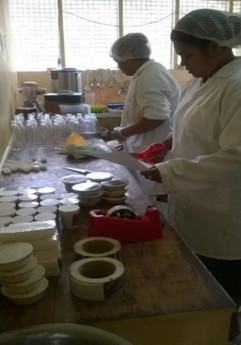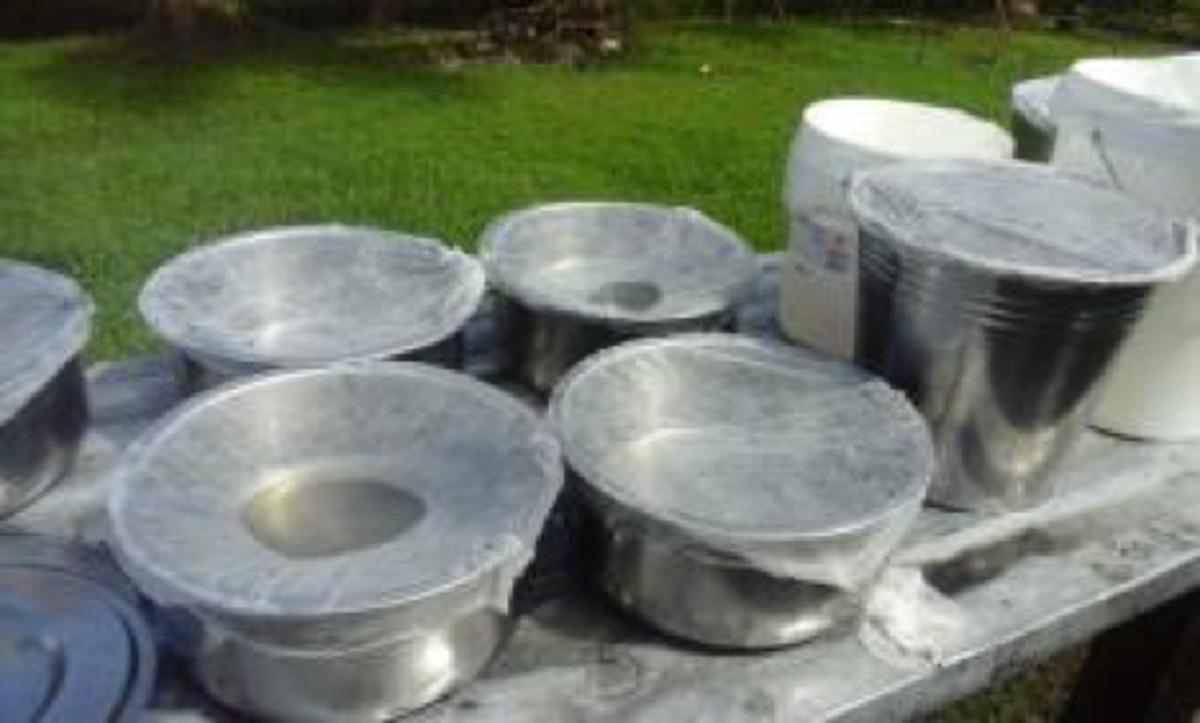Product and Persistence: How remote producers like Banaban Virgin Coconut Oil can achieve market share against all odds
 “We women can make a difference!” says exporter and entrepreneur Terikano Takesau, who began the Banaban Virgin Coconut Oil (BVCO) to improve opportunities for her Banaba people who live on Fiji’s Rabi Island. The Banaba people were forcibly removed to Rabi Island from their homeland of Ocean Island (now part of Kiribati) in 1945 so phosphate mining could continue there. On Rabi Island there were few opportunities for the population of about 5,000 to make money.
“We women can make a difference!” says exporter and entrepreneur Terikano Takesau, who began the Banaban Virgin Coconut Oil (BVCO) to improve opportunities for her Banaba people who live on Fiji’s Rabi Island. The Banaba people were forcibly removed to Rabi Island from their homeland of Ocean Island (now part of Kiribati) in 1945 so phosphate mining could continue there. On Rabi Island there were few opportunities for the population of about 5,000 to make money.
Terikano herself moved away and raised her three children and worked in the telecommunications industry – forming strong business networks that she now leverages for Banaban Virgin Coconut Oil.
Terikano always maintained close links with her Rabi Island community and the plight of the Banabans, who lost their homeland and many practical skills through the dislocation caused by their forced migration.
Determined to support the Banaba people, she worked hard since about 2010 to develop the business plan and source start-up funding to begin the Banaban Virgin Coconut Oil.
Now in its fourth year of business, after opening in 2014, Banaban Virgin Coconut Oil’s sales continue to grow along with its reputation for high quality, sun-dried oil that is primarily exported as a cosmetic ingredient.
“We’ve been successful because we’ve kept our financials under control,” Banaban Virgin Coconut Oil Manager, Terikano explained.
“Cutting costs where necessary, and using roadside sales to bolster cashflows to ensure that each month covers the coconut purchases, transport costs and salaries.”
Production is also increasing, now at about 250 litres of virgin coconut oil per month with Terikano forecasting that volume can soon double to about 500 litres/month.
But in the early days it was difficult, and many thought the business would fail.
“People would challenge us, saying how is this business benefiting us women? We’re not employed by you.”
Terikano took the criticism head-on, and went and spoke to the different village associations around the island. She explained how they could harvest and sell coconuts to Banaban Virgin Coconut Oil, or they could use the by-products to make handicrafts, or weave and sell baskets to assist in transporting coconuts by boat around the island to the factory.
“Now we can start to show them the results, as we slowly build our markets while focussing on maintaining a high-quality product.”
The growth of Banaban Virgin Coconut Oil is directly benefitting the Banaba people. “The sale of one sack of coconuts makes a big difference to families on the island. With the $15 they can buy cooking items, or travel over to Savusavu to buy clothes, and a treat for the children.”
"The sale of one sack of coconuts makes a big difference to families on the island."
Starting the company
Starting the company was a difficult journey for Terikano, who drew upon her leadership skills, strong networks and entrepreneurial skills to start a business in remote Rabi.
Her leadership skills had been sharpened through participation in the Vodafone ‘World of Difference’ leadership program, and in 2013 she was nominated to attend a training course on Whole Nut Processing on neighbouring Taveuni Island with the Fijian Ministry of Agriculture.
To source start-up funds, Terikano lobbied the government and was successful when the national ‘Look North Project’ provided funding for the Banaban factory facility to be built. The Rabi Council also invested $13,000 as seed capital to pay operational expenses. Finally, the Australian-based Nature Fiji Pty Ltd stepped-in to further assist with $20,000 worth of virgin coconut oil equipment to equip the factory for its initial start-up, coupled with a lucrative agreement to purchase products for three years.
Terikano’s strong networks have also been central to Banaban Virgin Coconut Oil’s success, including business connections and inspiration she has gathered through her involvement with the National Council of Women, the Fiji Arts Council and the Ministry of Women, Children and Poverty Alleviation.
Perhaps central to its success, has been the dedication of the Banaban Virgin Coconut Oil staff and people of Rabi, plus those in government, private sector and development partners who have supported them.
“My staff work as a team, and sometimes we’ve had to prioritise salary payment. Cashflow is critical, and very difficult to maintain,” Terikano explained.
“We don’t have banking facilities close by, so money has to go from sales straight back to paying our suppliers,” she added.
“Because of our teamwork and passion we did not work to get paid but to get the business moving and in the end to make a difference in the lives of our people especially our women. My staff have accepted these decisions because I’ve always kept them informed about how the business is developing.”
Overcoming Key Challenges
Many small virgin coconut oil enterprises such as the Banaban Virgin Coconut Oil have been promoted as viable village-scale enterprises.
However, many have failed by not having adequate connections to end-markets; not being of sufficient scale to achieve the throughput of product to achieve reasonable returns on investment; and struggling to achieve low final moisture contents in their oils (<1 per cent). Banaban Virgin Coconut Oil has managed to stay in business through a combination of hard work, community cohesion, support from the island council and good connections to off-shore business.
Quality is Key
The sun-drying process by Banaban Virgin Coconut Oil VCO makes the difference in their oils. Oil is dried for a period of up to two weeks to ensure that the moisture content is almost zero. Low moisture content contributes to increasing the shelf-life of their products and sets it apart from some other virgin coconut oil products. The time taken to properly dry the oils is never compromised an and is a key stage in processing.
Another key contributor to its success, were the results of a market analysis case study of the Banaban Virgin Coconut Oil value chain, used as an example of the many small virgin coconut oil businesses in operation across the Pacific.
The case study was commissioned by the Coconut Industry Development for the Pacific (CIDP) programme, funded by the European Union and managed by the Pacific Community (SPC).
“One of the great things about participating in the case study of our value chain is that we’ve been able to show our farmers that if they sell their husked coconuts to us, they are actually getting paid a lot more than if they extract the copra and sell that,” Terikano explained.
“It’s an old Banaba problem – we’ve always struggled to see the difference between a shilling and a penny. When we were in the colonial phase, we used to think that because the penny was bigger, it was worth more than the shilling.”
“Our farmers were the same, because they get paid about $1/kg for copra, but we only pay 20 cents for each husked nut. But this is without the labour of splitting and shelling-out the copra, so they’re much better off.”
As a result of the case study’s insights and new connections, Banaban Virgin Coconut Oil has obtained agreement for on-going sales of oil to Essence of Fiji, contributing new sales (by volume) of 30 percent.
Other barriers to expansion are also being addressed. The road to the factory on the island has been recently improved by the Rabi Council. Also, the Fijian Ministry of Agriculture has assisted with a new generator to enable the factory to run its processors for a full day. Previously the factory relied on the Rabi Council generator which only ran for only half of each day. Ultimately the factory hopes to use solar power, to avoid the high cost of fuel for the generator. Following the results of the case study, CIDP has also provided technical assistance to assist in testing and improving Banaban Virgin Coconut Oil’s products, factory design and factory layout.
Another significant change has been the Fijian Ministry of Women contributing a second cold press machine to enable increased throughput. This means the company now has a staff of four people, with three automatically operated coconut scrapers and two hydraulic cold presses.
The Banaban Virgin Coconut Oil team has also built a roof over the drying area and re-organised the layout of the factory.
Perhaps most importantly, the case study will help Banaban to source new markets and private investment or industry development support by documenting the current business case.
The company is slowly becoming more independent after strong support in its first four years.
Small amounts of support have gone a long way, and Banaban Virgin Coconut Oil is showing the Banaba Islanders that they can re-build their financial independence and take control of their lives.
About Coconut Industry Development for the Pacific:
Coconut Industry Development for the Pacific (CIDP) is a joint initiative of the Pacific Community (SPC) and the European Union (EU) as part of a broader economic partnership between the EU and the African Caribbean Pacific (ACP) states. The aim of CIDP is to bolster the coconut sector in the region through improving the competitiveness of small producers engaged in the coconut value chains, strengthening regional integration of related markets and the intensification of production across the Cook Islands, Federated States of Micronesia, Fiji, Kiribati, Republic of the Marshall Islands, Nauru, Niue, Palau, Papua New Guinea, Samoa, Solomon Islands, Timor Leste, Tonga, Tuvalu and Vanuatu. The programme runs from 2016-2018 and is valued at 4 million Euro.
For more information:
Visit LRD website - coconut industry development for the Pacific
